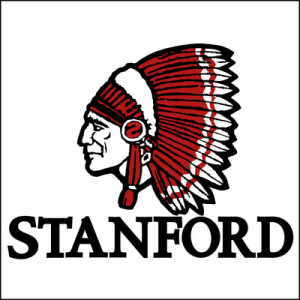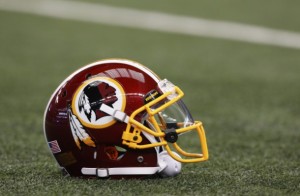Time for a change
The recent controversy over the Washington Redskins name has created a media frenzy. It’s time to end the disprution and change the name once and for all.
The derogatory term “Redskin” is slang for American Indian. Dating back to the 17th century, the term “Redskin” was used to describe the naturally darker skin color of those that were first native to the north. Many people of which the name originated from now label the nickname as disrespectful.
“The ‘R’ word is no different than the ‘N’ word,” Clyde Bellecourt, Co-Founder of the American Indian Movement said.
Clyde is right. How would African Americans, Hispanics, Asians or any other ethnic group like it if we used names as offensive as the “N” word, Plastering their faces on our football fields and hanging their nickname all over our cities? The name no longer represents the heritage of their culture or the honors the greatness of their past, in turn it becomes nothing more than an insult.
For decades, many activists groups, tribes and individuals have tried to change the name. It hasn’t been until now that people are starting to listen. Bob Costas, NBC’s Sunday Night Football host and television analyst, refuses to say the nickname.
“It is an insult, a slur, no matter how benign the present-day intent,” Costas said.
Not only has the media refrained from saying the name, others like President Obama and leaders from all levels of our in our government are calling for reconsideration. Behind it all are the Native American’s themselves, pushing for the name change. Many have come together gaining attention in the spotlight by boycotts and protests and even the help from the media.
It doesn’t stop here. Over 2,000 high school and college sports teams have changed their mascot name due to controversy. Miami University formerly known as the Redskins that an easy transition over the controversial mascot names is manageable. Showing respect for the Native Americans and furthermore reestablishing Miami’s athletic sports program.
So why haven’t the Washington Redskins changed their name, especially considering that they are in the heart of our nations capitol? Dan Snyder, current Owner of the Redskins has refused to change the mascot name.
“We’ll never change the name. It’s that simple. NEVER — you can use caps.” Snyder said to USA Today.
With Snyder sending a clear message indicating that no change will happen anytime soon, it causes me to question why he is against a simple change of a mascot.
To Synder, it isn’t about the Native American people. The morality of the name doesn’t mean much to him. It’s about the profit the team would make. Its about tradition for him and the rest of the organization. Tradition that has surpassed the team for more than 80 years. A tradition that has brought home three Super Bowl wins. Ones that highlight phenomenal athletes and coaches coming together under one mascot name.
However, what Snyder doesn’t see is that it is just a nickname. It wouldn’t change the history of the football team but instead become part of it. The Redskins mascot name becomes part of a story that Synder should be proud of one day, one that the Native American’s should be proud of too for coming together and seeking change. <<<
Don’t shed Skins’ name
The Redskins controversy isn’t about Native American’s taking offense to Washington’s name. Instead, it is commentary on our country’s pursuit of political correctness.
The sports world is a unique entity. In theory, it is supposed to be free from the controversies of our society, existing solely as a medium of entertainment. But in reality, sports is often a way for the world we live in to face the issues that plague our society. Cue the Washington Redskins scandal, enter stage left. The Redskins have recently come under fire from Congress, the media, and even President Barack Obama for having a name that may be potentially offensive and is considered by many to be a racial slur. And while I do agree that the name is offensive, the reason for wanting the change are wrong.
The Washington Redskins organization is a proud and honored football franchise, having won three Super Bowls and 13 divisional titles, but their franchise’s name is in jeopardy of being ruined by the tidal wave of political correctness plaguing our society. Most of those who support the name change, such as Congress and the media, are groups of middle aged, wealthy, white Americans.
As stated by Rick Reilly, one of America’s most revered sports columnists, in his opinion piece on the subject, a majority of Native Americans have no issue with the term. Some high schools on reservations, where Native American populations are over 90 percent, even have “Redskins” as their mascot. They have no issue with it, so why should fans of the NFL?
A poll in the March 2002 issue of Sports Illustrated found that 81 percent of Native American respondents thought high school or college teams should not stop using Native American nicknames, and 83 percent of Native Americans respondents thought that pro teams should not stop using Native American nicknames, symbols and mascots. Ten years on, this sentiment has not changed much. The Associated Press recently did a national poll and found that 79 percent of the people polled had no problem with the name “Redskins.”
We’ve also encountered this locally before as well. In 1972, after many years of petitioning the University, the Stanford American Indian Organization was successful in having the Stanford Indians name permanently changed to the Stanford Cardinal. The difference between the Stanford Indians and the Redskins is that the Stanford American Indian Organization clearly was against the Indian name, while the Redskins has support of Native Americans across the country.
This clearly shows that the term “Redskins” is not the center of this issue, but that our country’s obsession with being politically correct 100 percent of the time is. If our nation is so set on being politically correct, that’s fine, but start where it matters the most and it’ll have the most impact. Changing the Redskins’ name is not solving the issue, only covering it up.
Say hypothetically the NFL gives into the demands of these groups. What’s next? The NFL would put itself, and other national sports leagues, into a difficult situation. By giving into these demands, it sets a precedent for the future. Changing the Jacksonville Jaguars’ name to the Jacksonville Ethically Treated and Protected Jaguars, because PETA does not want the watchers of the NFL to think animal cruelty is acceptable, could be next.
Or what if Notre Dame had to change their nickname from the Fightin’ Irish to something that does not capitalize on a negative racial stereotype: perhaps the Mellowed out, Peaceful Irish. I’m sure that name will have opposing teams scared come bowl season. No one is complaining about either of these teams, because we have accepted both of these team names as being both culturally acceptable and politically correct. But if the Redskins change their name, then soon we could see these teams’ names and dozens of others as being offense. When that happens, we lose some of the tradition that makes sports so great.
Perhaps the worst thing about this controversy is that it is distracting the average sports fan. They cannot focus on the game and it takes away from the Washington Redskins’ season. For someone that casually watches the NFL, they only see the controversy. They will not be able to see the lackluster return of Robert Griffin III, or that the Redskins could be in store for a late season playoff push in the weak NFC East. And when football loses the main attention of the public, then it is doomed to fail.
In the end, this issue is not about the NFL. It is about our society trying to make amends for an injustice that was committed over 200 years ago. And while that is a noble intention, simply changing a professional sport team’s name trivializes the issue. It turns a huge social injustice into a simple matter. If our society truly wanted to make amends for this problem, then changing the team’s name is the wrong thing to do.
We must actively reach out to Native American community and attempt to make a difference. That is why, as backwards as it may seem, the Washington Redskins must keep their name. They must keep the name for the sanctity and protection of the league’s past and future, for the precedent the NFL were to set if they did change the name, and for the need to get back to the sport we love to watch. Most of all, by simplifying such an injustice, our society would be doing more harm than good.
And that, is wrong.<<<






